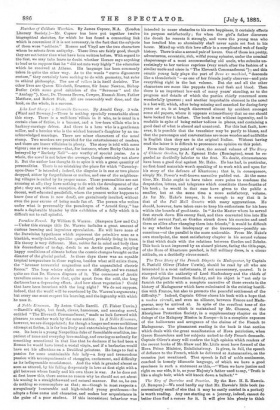The True Story of the French Dispute in Madagascar, by
Captain S. Pasfield Oliver (Fisher Unwin), should be read by all who are interested in a most unfortunate, if not unnecessary, quarrel. It is stamped with the authority of Lord Shaftesbury and the chiefs of the Aborigines Protection Society, and its object is "not only to furnish the public with a complete narrative of those events in the history of Madagascar which have culminated in the existing hostili- ties with France, but also to promote the peaceful settlement of the difficulty." Indeed, Captain Oliver closes his book with a hope that a mass vivendi, and even an alliance, between France and Mada- gascar, may be arrived at. In spite of the excellent tone of the narrative—a tone which is maintained by Mr. Chesson, of the Aborigines Protection Society, in a supplementary chapter on the doings of the Malagasy Mission in Europe—it is a complete exposure of the hollowness and arrogance of the claims of the French to Madagascar. The pleasantest reading in the book is that section which deals with the great manifestation of Hova patriotism, when Queen Rauavolona and her subjects united to defy French demands. Captain Oliver's story will confirm the high opinion which readers of the recent books of Mr. Shaw and Mr. Little must have formed of the Hova Prime Minister, Rainilaiarivony. It gives, in full, the speech of defiance to the French, which he delivered at Antananarivo, on the occasion just mentioned. That speech is fall of noble sentiments, couched in homely idiomatic language, of which we have a good specimen in such a statement as this,—" When we have justice and right on our side, it is, as your Majesty's father used to say, ` Truth is like a single hair, which will knock down a bullock.' "


































 Previous page
Previous page